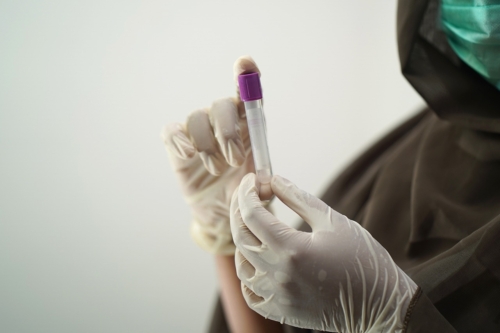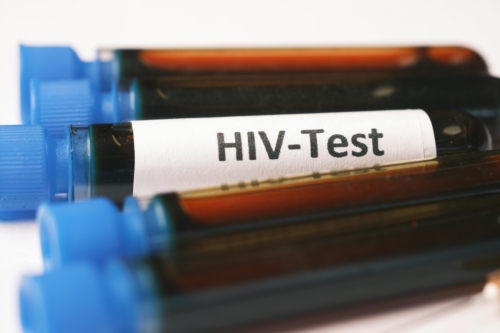
Infecting lover with HIV might not be 'causing grievous bodily harm', says lawyer
Basic issues remained undecided after an Auckland jury found X guilty of infecting his lover with HIV, the Court of Appeal has been told.
At a hearing in Wellington on Tuesday, X’s lawyer, Paul Borich, QC, said that, with medical advances, it was not clear that infecting someone with HIV must cause them grievous bodily harm.
It may be that such advances made it less harmful.
The jury should have been given the chance to decide whether HIV was grievous bodily harm, Borich said. Instead, the trial judge had said: “Take it from me, HIV amounts to grievous bodily harm.”
X appealed against his conviction for causing grievous bodily harm and criminal nuisance. He was sentenced to a total of two years and 10 months’ jail, and appealed against the sentence also.
In discussion with the three judges at the hearing, Borich agreed other issues not properly considered at the jury trial had been whether X had been the first to infect the victim, or had infected him at all.
The defence said the victim’s account of his sexual partners and drug-taking was not reliable.
During the period of the victim’s relationship with X, the victim had gone to the Philippines and there were questions about what he had done there.
Crown lawyer Mark Lillico accepted the trial process had not looked at all the issues it should have.
But he said HIV remained serious for the victim. It remained in his body even though medication reduced it to the point where his immune system could overcome it.
It must be that any infection of HIV was grievous bodily harm, Lillico said.
The victim had to disclose his HIV status in certain circumstances, and he would be tied to a regime of pills in the “first world”, Lillico said.
The criminal nuisance charge stood on its own and was for endangering the victim, regardless of whether X infected him with HIV, he said.
The Court of Appeal reserved its decision.
Man sentenced after knowingly infecting partner with HIV
An Auckland man convicted of knowingly infecting his partner with HIV has received a lesser sentence because of advances in treating it.
X was found guilty by jury in March of a charge of grievous bodily harm with reckless disregard and in the Auckland District Court was sentenced to two years and 10 months in jail yesterday.
He was also found guilty of committing a criminal nuisance by an unlawful act and was yesterday sentenced to 10 months to be served concurrently on that charge.
X tested positive for the virus on 27 February 2013.
On 26 July that year he was told of his legal obligations as an HIV positive man by a nurse.
In February 2014 X began a relationship with the victim which lasted several months during which they engaged in unprotected sex.
The victim did not know X was HIV positive and told the court he’d asked him on several occasions whether he was safe and was told it was.
After breaking up in October that year the victim tested positive to HIV in December.
Sentence provides a deterrent – Crown solicitor
At yesterday’s sentencing Crown solicitor Philip Arnold told the court it was important the sentence was used to deter people who would put other’s health at risk.
“There is no cure for the HIV virus, it is something [the victim] will have to live with for the rest of his life.
“This isn’t a case where X merely omitted to mention the fact that he had HIV. This is a case of continuing deceit over the period of the relationship.
“In effect X played Russian roulette with the victim’s health every time they had unprotected anal receptive intercourse, all the while aware that he was HIV positive and infectious.”
He said as well as the obvious physical impact, the victim was now facing limitations, had to monitor his health daily, is now under the same obligations to disclose HIV which limits sexual activities and removes life choices.
He said there was also stigma and misconceptions around the virus he was having to deal with.
X’s lawyer John Munro told the court a similar case from the ’90s being used to guide the prison sentence length should be adjusted given today’s societal and technological advances around the virus.
“The Crown have relied on a 1995 case of Mwai which was 22-years-ago when you died from HIV once it turned to AIDS and there’s no medication to assist a person.
“It is serious harm, we can’t dispute that, but we need to temper it. We need to temper it with the fact that we have medication, that you don’t die from it now. We need to temper with the way society deals with it, we need to temper it also with the fact that we have organisations now, HIV organisations who are dead against these prosecutions because they do not deter.”
Mr Munro pointed to the victim’s own promiscuity both before and after their relationship saying he was opening himself up to the risk with 20 sexual partners in the six months before.
Judge Sharp said she didn’t accept it was relevant.
Home detention sought
Mr Munro appealed to the judge to grant a sentence of two years or less, opening up the possibility of home detention.
In sentencing Judge Sharp said while HIV was no longer a death sentence it was very serious offending and he was obliged to tell the victim of his HIV status so he could choose whether to enter the relationship.
“I don’t think there’s a single person alive who would want to have HIV if they could avoid it.”
However she said the sentence imposed previously needed to take into account advances in medical science.
“It is my view that there needs to be a reduction to identify and acknowledge that the outcomes for an HIV positive person whilst still very serious are no longer life threatening…”
However, she said although she wished she could drop the sentence down to a level where home detention was possible she was unable to do that.
X to appeal
Family in the public gallery wept as she sentenced X to two years 10 months on the charge of grievous bodily harm with reckless disregard and 10 months to be served concurrently for the charge committing a criminal nuisance by an unlawful act.
He was given a reduction after having sought help for his methamphetamine addiction which both he and his partner were battling with at the time.
“Unfortunately it would appear from the evidence that I heard from trial that there is a grave element of sexual promiscuity and drug taking in certain portions of the gay community in Auckland and it would appear that both parties to this very sad and unfortunate episode were guilty of those things.
“And now we have two otherwise, I’m quite certain, very good people who suffer from the HIV virus and whose lives will be seriously compromised as a result.”
John Munro said he plans on appealing both the verdict and the sentence.
Outside court his sister, Sharon Smith, said her brother was the victim of a bitter ex-boyfriend and they would be taking the matter further.
“I’m doing pretty good considering I walked in here, broke down and had a bit of a cry. My sisters are obviously a bit more emotional.
“We’re not happy because justice hasn’t been done for my brother. But like I said, we will appeal, he is innocent and we hope and pray that justice will be served.
“That’s the most unjust thing to spend one day in prison for something you didn’t do, let alone two years and 10 months.”
HIV trial: X found guilty of infecting lover with virus
A man accused of infecting his boyfriend with HIV has been found guilty by a jury.
X, 37, was on trial at the Auckland District Court for causing grievous bodily harm with reckless disregard and committing a criminal nuisance by doing an unlawful act.
The Crown said X, knowing himself to be positive after a test in May 2013 and “fully aware of his obligation to disclose his health status to his sexual partner”, had unprotected sex with his live-in boyfriend from February 2014.
This caused his partner, who has name suppression, to contract HIV.
The defence said the complainant was untrustworthy and could have got the virus from someone else and that before they had intercourse the defendant told him he was positive.
After almost seven hours of deliberations, the jury found X guilty of both charges.
As the foreperson announced the verdict, X appeared shocked and family members started crying.
A woman yelled: “I have something to say. I’m really disgusted with the verdict. My brother is innocent.”
Other family members and friends appeared to be fuming and some cried.
X’s sister, Sharon Smith, said her brother was innocent and they were “very, very disappointed” with the verdict.
“He’s the most loving, caring and honest man. This is not his character,” she told the Herald outside court.
Smith said they would appeal the decision “whatever it costs”.
X will be sentenced in May.
Over three days of evidence, the court heard how the couple met in February 2014 at Western Springs Park.
The complainant said he asked X about his HIV status and he told him he’d had a test three months earlier and was negative.
After two months of dating and during a holiday to the Philippines with friends, the man grew ill with nausea, aches, a fever and a rash which spread over his body.
During evidence he said he figured it was probably a tropical virus but later learned these were symptoms of seroconversion, when a person first develops antibodies for HIV.
The jury was shown texts from the man to X that October in which he asked what his sickness “really is”.
“So please tell me now for real, have you got HIV or something? You have to tell me if you do. Something’s not been said, I know it. Is that why you avoid having sex?”
A later text read: “Will you promise me to get that test and never take risks with your own or anybody else’s life again?”
Prosecutor Jo Murdoch said the texts “speak volumes” that the man had no idea his lover was HIV-positive. She said it was an “implausible version of the evidence”.
“These are the texts from a man who has not been told. These are texts from a man who wanted answers.”
And they were not texts sent from someone who “vindictively fabricated” a lie after the relationship broke down, Murdoch said.
“X was lying to [the complainant]. Every time they had sex, he was lying to him.”
Murdoch also questioned X’s conduct after learning he had the virus as he failed to take medication and therefore didn’t “take responsibility for his diagnosis”.
But in his closing, defence lawyer Ross Burns said the jury had been asked to answer “really, important question based on some woolly evidence”.
There was nothing independent of the complainant’s evidence to support the Crown’s case, he said.
“You can’t just say, ‘Well there we go, that’s evidence of their responsibility’.”
The lawyer told the jurors they had to be certain the man didn’t have unprotected sex with another HIV-positive man – besides X – in the six months before they met.
Burns referred to the man’s police interview where he told them he was at Western Springs Park – a “notorious place where gay men cruise” – to meet a man.
During the trial, the man said he was looking for his dog.
“He was going there looking for sex and if he was doing it then who can say he didn’t do it the week before or the week before that.”
Burns asked the jury: “Can you trust him?”
And while he didn’t want to make the trial a “mud-slinging match” both men had unprotected anal sex with casual partners.
“What do you get from pointing the finger at each other, the answer is nothing. It works both ways.”
Man in court charged with infecting lover with HIV
A man who allegedly knowingly infected his partner with HIV promised he was “fine”, a court has been told.
X, 37, appeared at the Auckland District Court today defending a charge of causing grievous bodily harm with reckless disregard and one of committing a criminal nuisance by doing an unlawful act.
The Crown alleges X, knowing himself to be positive after a test in May 2013 and “fully aware of his obligation to disclose his health status to his sexual partner”, had unprotected sex with his live-in boyfriend.
This caused his partner, who has name suppression, to contract HIV.
The man told the jury he first met X one morning in a park in early 2014 when he was looking for his dog. They got along and he invited X back to his home.
There he asked X what his status was.
X told him was “fine” and that he’d been tested three months earlier, the man told the court.
“I was pleased and I thought he was pretty cool and we got on really well.”
The man said knew he was negative himself because he’d been regularly tested as he was planning on having a baby.
“I had a burning desire to be a father.”
Once the couple had established they were both “safe” during that first meeting, the man performed unprotected oral sex on X and a few weeks later they had intercourse.
A relationship blossomed.
At one point during his evidence, the man was overwhelmed with emotion and had to leave the courtroom for a break.
After two months of dating and during a holiday to the Philippines with friends, the man grew ill with nausea, aches, a fever and a rash which spread over his body.
He said he figured it was probably a tropical virus and busied himself with planning his mother’s 90th birthday. He later learned these were symptoms of seroconversion, when a person first develops antibodies for HIV.
But while he was sick he stopped donating sperm to the woman he’d chosen to be his co-parent “just in case”.
“I would never forgive myself if [something happened]. Just to be safe for her sake,” he said.
The couple quickly grew close and X moved in but by August the relationship had broken down amid suspicions the defendant was unfaithful.
The man said he got in touch with one of X’s ex-boyfriends and subsequently texted the accused on October 21, 2014, asking what his sickness “really is”.
“So please tell me now for real, have you got HIV or something? You have to tell me if you do. Something’s not been said, I know it. Is that why you avoid having sex?”
He sent other similar texts but they all went unanswered although they continued to see each other.
That December, he was tested again for HIV and learned he was positive.
But defence lawyer Ross Burns said the Crown had to prove the man didn’t have sex with anyone other than the three men who will be called as witnesses between the time the complainant tested negative in August 2013 and when he tested positive in December 2014.
The other partners have all tested negative for HIV.
“If there is a reasonable possibility that the complainant had sex over that 16-month period with any other person, then you cannot find the defendant guilty,” Burns told the jury.
During cross-examination, the lawyer asked whether the man knew the park in Western Springs where he first met Filitonga was a “quite a well-known gay cruising spot”.
He asked whether the man had in fact gone looking for a partner.
“That’s not the case. I don’t like that place and I don’t do that,” he responded.
The man admitted he’d had brief relations with previous partners who have since tested negative for HIV.
The trial continues and is set down for two weeks.
The law and HIV
• If you are HIV positive, you do not have to disclose your status before having intercourse as long as you are using a condom.
• If the sex is unprotected, the HIV-positive person has a legal duty to disclose his/her status.



